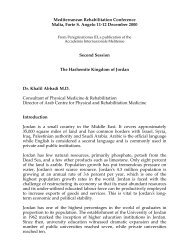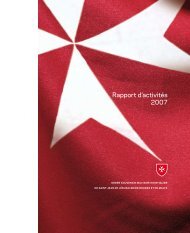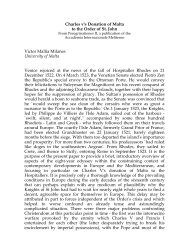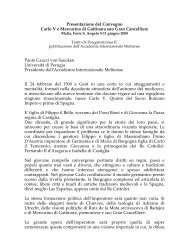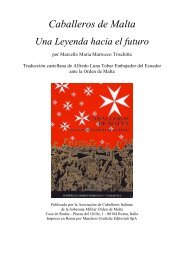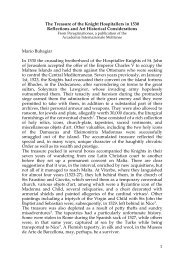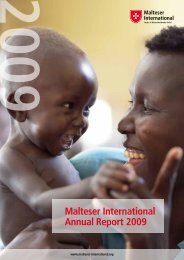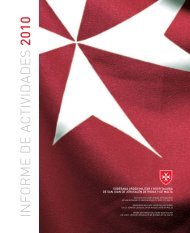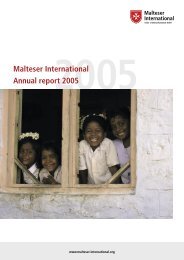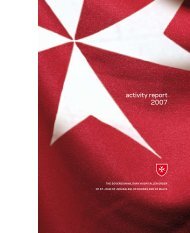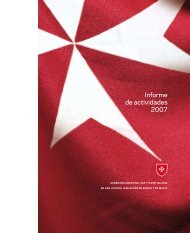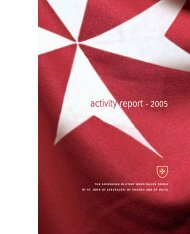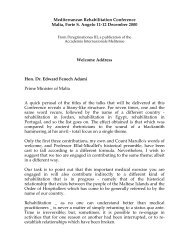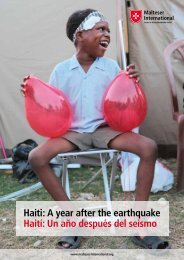CO N S T I T U T I O N A L C H A RT E R - Ordine di Malta
CO N S T I T U T I O N A L C H A RT E R - Ordine di Malta
CO N S T I T U T I O N A L C H A RT E R - Ordine di Malta
You also want an ePaper? Increase the reach of your titles
YUMPU automatically turns print PDFs into web optimized ePapers that Google loves.
<strong>CO</strong> N S T I T U T I O N A L C H A <strong>RT</strong> E R<br />
OF THE SOVEREIGN MILITA RY<br />
H O S P I TALLER ORDER<br />
OF ST. JOHN OF JERUSALEM<br />
OF RHODES AND OF MALTA<br />
promulgated 27 June 1961<br />
revised by the Extraor<strong>di</strong>nary Chapter General<br />
28-30 April 1997<br />
ROME 1998
This free translation is not be intended as a mo<strong>di</strong>fication of<br />
the Italian text approved by the Extraor<strong>di</strong>nary Chapter G e n e r a l<br />
28-30 April 1997 and pubblished in the Bollettino Ufficiale, 12<br />
J a n u a ry 1998.<br />
In cases of <strong>di</strong>ff e rent interpretations, the official Italian text<br />
p revails (Art. 36, par. 3 Constitutional Chart e r ) .<br />
2
I N D E X<br />
C O N S T I T U T I O N A L C H A <strong>RT</strong> E R<br />
Ti t l e I - TH E O R D E R A N D I T S N AT U R E . . . . . . . . . . . . . 16<br />
A rticle 1 Origin and nature of the Order . . . . . . . . 16<br />
A rticle 2 P u r p o s e . . . . . . . . . . . . . . . . . . . . . . . 6<br />
A rticle 3 S o v e reignty . . . . . . . . . . . . . . . . . . . . . 7<br />
A rticle 4 Relations with the Apostolic See . . . . . . . . . 7<br />
A rticle 5 S o u rces of the Ord e r’s law . . . . . . . . . . . 7<br />
Article 6 Flags, insigna and armorial bearings of the O rd e r . 8<br />
A rticle 7 Language . . . . . . . . . . . . . . . . . . . . . . 8<br />
Ti t l e II - TH E M E M B E R S O F T H E O R D E R . . . . . . . . . . . . 9<br />
A rticle 8 The Classes . . . . . . . . . . . . . . . . . . . . . 9<br />
A rticle 9 Obligations of the members . . . . . . . . . . . 10<br />
A rticle 10 Assignment of members . . . . . . . . . . . . . 10<br />
A rticle 11 Duties and offices . . . . . . . . . . . . . . . . 11<br />
Ti t l e III - GO V E R N M E N T O F T H E O R D E R . . . . . . . . . . . . 12<br />
A rticle 12 The Grand Master . . . . . . . . . . . . . . . . 12<br />
A rticle 13 Requisites for election of Grand Master . . . . 12<br />
A rticle 14 The Grand Master’s oath . . . . . . . . . . . . 12<br />
A rticle 15 Powers of the Grand Master . . . . . . . . . . 12<br />
A rticle 16 Resignation from office by the Grand Master . 13<br />
A rticle 17 E x t r a o rd i n a ry Government . . . . . . . . . . . . 13<br />
A rticle 18 The High Offices . . . . . . . . . . . . . . . . . 14<br />
A rticle 19 The Prelate . . . . . . . . . . . . . . . . . . . . 14<br />
A rticle 20 The Sovereign Council . . . . . . . . . . . . . . 15<br />
A rticle 21 The Government Council . . . . . . . . . . . . 16<br />
A rticle 22 The Chapter General . . . . . . . . . . . . . . . 16<br />
A rticle 23 The Council Complete of State . . . . . . . . . 17<br />
A rticle 24 General norms for elections . . . . . . . . . . . 18<br />
A rticle 25 The Juri<strong>di</strong>cal Council . . . . . . . . . . . . . . 18<br />
A rticle 26 Ju<strong>di</strong>cial regulations . . . . . . . . . . . . . . . . 19<br />
A rticle 27 The Board of Au<strong>di</strong>tors . . . . . . . . . . . . . . 19<br />
Ti t l e IV - TH E O R G A N I Z AT I O N O F T H E O R D E R . . . . . . . . . 2 0<br />
A rticle 28 Establishment of organizations . . . . . . . . . 2 0<br />
A rticle 29 G o v e rnment of Priories . . . . . . . . . . . . . 2 0<br />
3
A rticle 30 Te rm of office of Priors . . . . . . . . . . . . . 21<br />
A rticle 31 Lieutenant of Prior . . . . . . . . . . . . . . . . 21<br />
A rticle 32 Vicar and Procurator of a Priory . . . . . . . . 21<br />
A rticle 33 Subpriories and appointment of R e g e n t s . . . . 22<br />
A rticle 34 Associations . . . . . . . . . . . . . . . . . . . . 22<br />
A rticle 35 Delegations . . . . . . . . . . . . . . . . . . . . 22<br />
A rticle 36 Text and official translation of the<br />
Constitutional Charter . . . . . . . . . . . . . . 23<br />
A rticle 37 Transitional regulations . . . . . . . . . . . . . 23<br />
4
<strong>CO</strong> N S T I T U T I O N A L C H A <strong>RT</strong> E R<br />
OF THE SOVEREIGN MILITA RY<br />
H O S P I TALLER ORDER<br />
OF ST. JOHN OF JERUSALEM<br />
OF RHODES AND OF MALTA<br />
5
TITLE I<br />
THE ORDER AND ITS NAT U R E<br />
A<strong>RT</strong> I C L E 1<br />
Origin and Nature of the Ord e r<br />
P a r. 1 —<br />
The Sovereign Military and Hospitaller Order of Saint John of Jerusalem, of Rhodes,<br />
and of <strong>Malta</strong>, arose from a group of hospitallers of the Hospice of Saint John of<br />
J e rusalem who had been called upon by circumstances to augment their original<br />
charitable enterprise with military service for the defence of pilgrims to the Holy<br />
Land and of Christian civilization in the East. It is a lay religious Ord e r, by tra<strong>di</strong>tion<br />
military, chivalrous and nobiliary, which in time became sovereign on the islands<br />
of Rhodes and later of <strong>Malta</strong>.<br />
P a r. 2 — In nations where it exercises its activity in virtue of its rights or of intern a-<br />
tional conventions, the Ord e r’s stru c t u re comprises: Grand Priories, Priories, Subpriories<br />
and National Associations.<br />
P a r. 3 — In this Constitution and in the Code the Sovereign Military Order of <strong>Malta</strong> is<br />
also re f e rred to as “the Order of <strong>Malta</strong>” or simply as “the Order”.<br />
P a r. 4 — In the rules which follow, the Grand Priories and the National Associations are<br />
also re f e rred to as Priories and Associations. The term Code refers to the Code<br />
of the Ord e r.<br />
A<strong>RT</strong> I C L E 2<br />
P u r p o s e<br />
P a r. 1 —<br />
The purpose of the Order is the promotion of the glory of God through the sanctification<br />
of its members, service to the faith and to the Holy Father, and assistance<br />
to one’s neighbour, in accordance with its ancient tra<strong>di</strong>tions.<br />
P a r. 2 — True to the <strong>di</strong>vine precepts and to the admonitions of our Lord Jesus Christ,<br />
guided by the teachings of the Church, the Order aff i rms and propagates the<br />
Christian virtues of charity and bro t h e rhood. The Order carries out its charitable<br />
works for the sick, the needy and refugees without <strong>di</strong>stinction of re l i g i o n ,<br />
race, origin and age.<br />
The Order fulfils its institutional tasks especially by carrying out hospitaller<br />
works, inclu<strong>di</strong>ng social and health assistance, as well as ai<strong>di</strong>ng victims of exceptional<br />
<strong>di</strong>sasters and of war, atten<strong>di</strong>ng also to their spiritual well-being and the<br />
s t rengthening of their faith in God.<br />
P a r. 3 — In order to be able to perf o rm their institutional tasks, the Priories and Associations<br />
may, accor<strong>di</strong>ng to the regulations of the Code, establish dependent org a n-<br />
izations in accordance with national laws and international conventions and<br />
a g reements made with States.<br />
6
A<strong>RT</strong> I C L E 3<br />
S o v e re i g n t y<br />
P a r. 1 —<br />
The Order is a subject of international law and exercises sovereign functions.<br />
P a r. 2 — Legislative, executive and ju<strong>di</strong>cial functions are re s e rved to the competent bo<strong>di</strong>es<br />
of the Order accor<strong>di</strong>ng to the provisions of the Constitution and Code.<br />
A<strong>RT</strong> I C L E 4<br />
Relations with the Apostolic See<br />
P a r. 1 —<br />
The Order is a legal entity recognized by the Holy See.<br />
P a r. 2 — Religious members through their vows, as well as members of the Second Class<br />
t h rough the Promise of Obe<strong>di</strong>ence, are only subject to their appropriate Superiors<br />
in the Ord e r.<br />
In accordance with the Code of Canon Law, the churches and conventual institutions<br />
of the Order are exempt from the juris<strong>di</strong>ction of the <strong>di</strong>oceses and are<br />
d i rectly subject to the Holy See.<br />
P a r. 3 — In the conduct of relations with the Apostolic See, the acquired rights, customs<br />
and privileges granted to the Order by the Supreme Pontiffs are in force unless<br />
e x p ressly abro g a t e d .<br />
P a r. 4 — The Supreme Pontiff appoints as his re p resentative to the Order a Car<strong>di</strong>nal of<br />
the Holy Roman Church on whom are conferred the title of C a r<strong>di</strong>nalis Patro n u s<br />
and special faculties. The C a r<strong>di</strong>nalis Patro n u s has the task of promoting the spiritual<br />
interests of the Order and its members and relations between the Holy See<br />
and the Ord e r.<br />
P a r. 5 — The Order has <strong>di</strong>plomatic re p resentation to the Holy See, accor<strong>di</strong>ng to the norm s<br />
of international law.<br />
P a r. 6 — The religious nature of the Order does not preju<strong>di</strong>ce the exercise of sovere i g n<br />
p re rogatives pertaining to the Order in so far as it is recognized by States as a<br />
subject of international law.<br />
A<strong>RT</strong> I C L E 5<br />
S o u rces of the Ord e r’s Law<br />
The sources of the Ord e r’s law are :<br />
1 – the Constitution, the Code of the Order and, as an adjunct, canonical legislation;<br />
2 – the legislative provisions accor<strong>di</strong>ng to Art. 15, par. 2, a) of the Constitution;<br />
3 – i n t e rnational agreements ratified accor<strong>di</strong>ng to Art. 15, par. 2, h) of the Constitut<br />
i o n ;<br />
7
4 – its customs and privileges;<br />
5 – the Code Rohan where not in contra<strong>di</strong>ction to current norm s .<br />
A<strong>RT</strong> I C L E 6<br />
Flags, Insignia and Armorial Bearings<br />
of the Ord e r<br />
P a r. 1 —<br />
The flag of the Order bears either the white latin cross on a red field or the white<br />
eight - pointed cross (cross of <strong>Malta</strong>) on a red field.<br />
P a r. 2 — The armorial bearings of the Order <strong>di</strong>splay a white latin cross on a red oval<br />
field, surrounded by a ro s a ry, all superimposed on a white eight - pointed cro s s<br />
and <strong>di</strong>splayed under a princely mantle surmounted by a cro w n .<br />
P a r. 3 — A special regulation, approved by the Grand Master with the deliberative vote<br />
of the Sovereign Council, defines the characteristics and the use of the flags,<br />
the insignia and the armorial bearings of the Ord e r.<br />
A<strong>RT</strong> I C L E 7<br />
L a n g u a g e<br />
The official language of the Order is Italian.<br />
8
TITLE II<br />
THE MEMBERS OF THE ORDER<br />
A<strong>RT</strong> I C L E 8<br />
The Classes<br />
P a r. 1 —<br />
The members of the Order are <strong>di</strong>vided into three Classes:<br />
A) the First Class consists of Knights of Justice, also called Professed, and of<br />
P rofessed Conventual Chaplains who have made religious vows;<br />
B) the Second Class consists of members in Obe<strong>di</strong>ence, who make the Pro m i s e<br />
a c c o r<strong>di</strong>ng to Art. 9, par. 2, and who are sub<strong>di</strong>vided into three categories:<br />
a) Knights and Dames of Honour and Devotion in Obe<strong>di</strong>ence<br />
b) Knights and Dames of Grace and Devotion in Obe<strong>di</strong>ence<br />
c) Magistral Knights and Dames in Obe<strong>di</strong>ence;<br />
C) the Third Class consists of those members who do not make religious vows<br />
or the Promise but who live accor<strong>di</strong>ng to the norms of the Church and are<br />
p re p a red to commit themselves to the Order and the Church. They are <strong>di</strong>vided<br />
into six categories:<br />
a) Knights and Dames of Honour and Devotion<br />
b) Conventual Chaplains ad honore m<br />
c) Knights and Dames of Grace and Devotion<br />
d) Magistral Chaplains<br />
e) Knights and Dames of Magistral Grace<br />
f) Donats (male and female) of Devotion.<br />
P a r. 2 — The requisites for admission to the various classes and categories of membership<br />
a re determined by the Code.<br />
9
A<strong>RT</strong> I C L E 9<br />
Obligations of the Members<br />
P a r. 1 — The Knights and Chaplains belonging to the First Class profess the vows of<br />
p o v e rt y, chastity and obe<strong>di</strong>ence in accordance with the Code, thus aspiring to<br />
p e rfection accor<strong>di</strong>ng to the Gospel. They are religious for all purposes of Canon<br />
Law and are governed by the particular rules which concern them. They are<br />
not obliged to live in community.<br />
P a r. 2 — By virtue of the Promise, members of the Second Class oblige themselves to<br />
strive for the perfection of Christian life in conformity with the obligation of<br />
their state, in the spirit of the Ord e r.<br />
P a r. 3 — The members of the Order are to conduct their lives in an exemplary manner<br />
in conformity with the teachings and precepts of the Church and to devote<br />
themselves to the charitable activities of the Ord e r, accor<strong>di</strong>ng to the pro v i s i o n s<br />
of the Code.<br />
P a r. 4 — Members of the Second and of the Third Class, with the exception of priests,<br />
make a financial contribution through their national organizations to the Grand<br />
M a g i s t ry, fixed by the Chapter General.<br />
A<strong>RT</strong> I C L E 1 0<br />
Assignment of Members<br />
P a r. 1 —<br />
W h e re only a Priory already exists, all members of the three Classes automatically<br />
belong to it.<br />
P a r. 2 — W h e re a Subpriory is established, only the members of the First and Second<br />
Class belong to it.<br />
P a r. 3 — W h e re an Association is established, the members of the three Classes belong<br />
to it.<br />
P a r. 4 — W h e re a Priory or Subpriory is established in the terr i t o ry where an Association<br />
already exists, all the members of the First and Second Class are also<br />
members of the Priory or Subpriory.<br />
P a r. 5 — W h e re neither a Priory nor a Subpriory exists in the terr i t o ry, the members of<br />
the First and Second Class are also aggregated in gremio re l i g i o n i s ( d e p e n d a n t<br />
d i rectly on the Grand Commander).<br />
P a r. 6 — W h e re neither a Priory nor an Association exists in the terr i t o ry, the members<br />
of the Third Class are assigned to an institution of the Order as the Grand<br />
Master decides.<br />
P a r. 7 — The Grand Master with the deliberative vote of the Sovereign Council, having<br />
h e a rd the Priors, Regents or Presidents concerned, may transfer a member of<br />
the Ord e r, with his consent, to a Priory, Subpriory or Association, accor<strong>di</strong>ng to<br />
the above norm s .<br />
10
A<strong>RT</strong> I C L E 1 1<br />
Duties and Off i c e s<br />
P a r. 1 —<br />
The duties and offices of Grand Master and of Grand Commander are conferred upon<br />
P rofessed Knights in Perpetual Vo w s .<br />
P a r. 2 — The office of Prior is entrusted to Professed Knights in Perpetual or Te m p o r a ry<br />
v o w s .<br />
P a r. 3 — The High Offices and the offices of the Sovereign Council, in keeping with Art .<br />
20, par. 4, and the offices of Chancellor, Receiver and Hospitaller of the Priories<br />
and Subpriories as well as those of Regent, Lieutenant, Vicar and Pro c u r a t o r, are<br />
held preferably by Professed Knights.<br />
If Knights in Obe<strong>di</strong>ence are elected for their specific qualifications, their election<br />
must be confirmed by the Grand Master.<br />
P a r. 4 — The positions of High Officers, Priors, Vicars, Lieutenants, Procurators, Regents,<br />
Chancellors of Priories, and of at least four of the six Councillors of the Sovereign<br />
Council, are re s e rved to Knights having the requisites for Honour and Devotion<br />
or Grace and Devotion.<br />
11
TITLE III<br />
GOVERNMENT OF THE ORDER<br />
A<strong>RT</strong> I C L E 1 2<br />
The Grand Master<br />
S o v e reign pre rogatives and honours and the title “Most Eminent Highness” are re s e rv e d<br />
to the Grand Master, Head of the Ord e r.<br />
A<strong>RT</strong> I C L E 1 3<br />
Requisites for Election of Grand Master<br />
P a r. 1 —<br />
The Grand Master is elected for life by the Council Complete of State from among<br />
the Professed Knights with at least ten years in perpetual vows if they are younger<br />
than fifty years of age; in the case of Professed Knights who are older, but who<br />
have been members of the Order for at least ten years, three years in perpetual<br />
vows are suff i c i e n t .<br />
P a r. 2 — The Grand Master and the Lieutenant of the Grand Master must have the nobili<br />
a ry requisites prescribed for the category of Knights of Honour and Devotion.<br />
P a r. 3 — B e f o re the assumption of the office, the election of the Grand Master is to be<br />
communicated by letter to the Holy Father by the person elected.<br />
A<strong>RT</strong> I C L E 1 4<br />
The Grand Master’s Oath<br />
The person elected to the <strong>di</strong>gnity of Grand Master, having informed the Holy Father<br />
of the election, takes the following oath in the presence of the Car<strong>di</strong>nalis Patronus in<br />
solemn session of the Council Complete of State:<br />
“By this most Holy Wood of the Cross and by God’s Holy Gospels, I, N.N., do solemnly<br />
promise and swear to observe the Constitution, the Code, the Rule and the laudable<br />
customs of our Order and to administer the affairs of the Order conscientiously. So help<br />
me God, and if I do otherwise, may it be to the risk of my soul.”<br />
A<strong>RT</strong> I C L E 1 5<br />
Powers of the Grand Master<br />
P a r. 1 —<br />
The Grand Master, assisted by the Sovereign Council, sees to the exercise of his<br />
s u p reme authority, to the conferral of duties and offices, and to the general gove<br />
rnment of the Ord e r.<br />
12
P a r. 2 — It pertains to the Grand Master:<br />
a) to issue legislative measures, with the deliberative vote of the Sovereign Council,<br />
concerning matters regulated neither by the Constitution nor by the Code;<br />
b) to promulgate by decree the acts of govern m e n t ;<br />
c) to admit, with the deliberative vote of the Sovereign Council given in secre t ,<br />
members to the Novitiate and to Te m p o r a ry and Perpetual Vows of the First<br />
Class as well as to the year of probation and to the Promise of the Second<br />
C l a s s ;<br />
d) to admit, with the deliberative vote of the Sovereign Council, members of the<br />
First Class to Aspirancy;<br />
e) to receive members into the Third Class of the Ord e r, with the deliberative<br />
vote of the Sovereign Council or with a provision given on his authority alone<br />
(motu pro p r i o) ;<br />
f) to administer, with the assistance of the Sovereign Council, the assets of the<br />
Common Tre a s u re and to supervise the pro p e rt i e s ;<br />
g) to execute the acts of the Holy See, insofar as these relate to the Ord e r, and<br />
to inform the Holy See of the state and the needs of the Ord e r ;<br />
h) to ratify international agreements, with the deliberative vote of the Sovere i g n<br />
C o u n c i l ;<br />
i) to convene an Extraord i n a ry Chapter General which will have the faculty to<br />
<strong>di</strong>ssolve the Sovereign Council and elect a new one, in accordance with the<br />
n o rms of the Constitution and Code.<br />
P a r. 3 — The decrees of par. 2 b) are designated magistral or conciliar depen<strong>di</strong>ng on<br />
whether the act of government has been issued <strong>di</strong>rectly by the Grand Master or<br />
whether there has been prior consideration or prior deliberation by the Sovere i g n<br />
Council. When a deliberative vote is re q u i red, the Grand Master cannot issue a<br />
d e c ree at variance with that vote, but he is not obliged to issue a decree in conf<br />
o rmity with it.<br />
A<strong>RT</strong> I C L E 1 6<br />
Resignation from Of i c e<br />
by the Grand Master<br />
The resignation from office by the Grand Master must be accepted by the Sovere i g n<br />
Council and, to be effective, communicated to the Holy Father.<br />
A<strong>RT</strong> I C L E 1 7<br />
E x t r a o rd i n a ry Govern m e n t<br />
P a r. 1 —<br />
In the case of the permanent incapacity, resignation or death of the Grand Master,<br />
the Order is governed by a Lieutenant ad interim in the person of the Grand Commander<br />
who can carry out acts of ord i n a ry administration until the Office ceases to<br />
be vacant.<br />
13
P a r. 2 — The permanent incapacity of the Grand Master is declared by the Magistral Court<br />
of first instance in closed session on a petition by a two thirds majority of the<br />
members of the Sovereign Council, which has been convened and chaired by<br />
the Grand Commander or the Grand Chancellor, or has convened itself by an<br />
absolute majority.<br />
The petition is presented by the Grand Chancellor, or by a member of the Sove<br />
reign Council delegated for this purpose. If the petition is aff i rmed, the Grand<br />
Commander assumes the office of Lieutenant ad interim.<br />
P a r. 3 — In the case of the incapacity of the Grand Master for a period of more than<br />
one month, the Grand Commander assumes the ord i n a ry administration of the<br />
O rder and imme<strong>di</strong>ately convenes the Sovereign Council for confirmation.<br />
P a r. 4 — In the event of the incapacity of the Grand Commander, the Sovereign Council<br />
elects from among its members a Professed Knight in Perpetual Vows as Lieutenant<br />
ad interim.<br />
P a r. 5 — The Lieutenant of the Grand Master is elected in accordance with Art. 23, par.<br />
5, from among the Knights possessing the requisites re q u i red for election to<br />
Grand Master.<br />
B e f o re taking up his office, the Lieutenant of the Grand Master takes the oath<br />
in accordance with Art. 14.<br />
The resignation of the Lieutenant of the Grand Master must be accepted by the<br />
S o v e reign Council and with a resolution which must be communicated to the<br />
Holy Father in order to be eff e c t i v e .<br />
A<strong>RT</strong> I C L E 1 8<br />
The High Of i c e s<br />
P a r. 1 — The High Offices are :<br />
the Grand Commander<br />
the Grand Chancellor<br />
the Grand Hospitaller<br />
the Receiver of the Common Tre a s u re .<br />
P a r. 2 — The replacement of persons hol<strong>di</strong>ng High Offices is regulated by the Code.<br />
A<strong>RT</strong> I C L E 19<br />
The Pre l a t e<br />
P a r. 1 —<br />
The Prelate is appointed by the Supreme Pontiff, who chooses from among thre e<br />
can<strong>di</strong>dates presented by the Grand Master with the deliberative vote of the Sovereign<br />
Council. In the event that none of the three can<strong>di</strong>dates presented meets with<br />
the approval of the Holy Father, other can<strong>di</strong>dates will be pre s e n t e d .<br />
The Prelate assists the C a r<strong>di</strong>nalis Patro n u s in carrying out his mission to the<br />
O rd e r.<br />
14
P a r. 2 — The Prelate is the ecclesiastical superior of the clergy of the Order in sacerd o t a l<br />
functions. He ensures that the religious and priestly life of the Chaplains and<br />
their apostolate are conducted accor<strong>di</strong>ng to the <strong>di</strong>scipline and the spirit of the<br />
O rd e r.<br />
P a r. 3 — The Prelate assists the Grand Master and the Grand Commander in their re s p o n-<br />
sibility for both the spiritual life and religious observances of the members of<br />
the Order and in all matters concerning the spiritual nature of the works of the<br />
O rd e r.<br />
P a r. 4 — At each session of the Ord i n a ry Chapter General the Prelate presents a re p o rt on<br />
the spiritual state of the Ord e r.<br />
A<strong>RT</strong> I C L E 2 0<br />
The Sovereign Council<br />
P a r. 1 — The Sovereign Council assists the Grand Master in the Government of the Ord e r.<br />
P a r. 2 — The following are members of Sovereign Council:<br />
a) the Grand Master or the Lieutenant, who pre s i d e s ;<br />
b) the holders of the four High Offices and six Councillors.<br />
P a r. 3 — The members of the Sovereign Council, exclu<strong>di</strong>ng the Grand Master and the Lieutenant,<br />
are elected by the Chapter General by a majority of those pre s e n t .<br />
P a r. 4 — The Grand Commander and at least four other members of the Sovereign Council<br />
must be Professed Knights in Perpetual or Te m p o r a ry Vo w s .<br />
P a r. 5 — For the admission of members to the First Class only the members of the Sove<br />
reign Council who are Professed Knights in Perpetual or Te m p o r a ry Vows are<br />
entitled to vote.<br />
P a r. 6 — The members of the Sovereign Council remain in office until the next Chapter<br />
General and may be re-elected. For a third or further consecutive re-election to<br />
the same position a two-thirds majority of votes of those present is re q u i re d .<br />
P a r. 7 — The Grand Master does not vote on matters for which the Sovereign Council has<br />
a deliberative vote or must give its advice, notwithstan<strong>di</strong>ng Art. 15, par. 3.<br />
In the case of a tie vote among the Councillors, inclu<strong>di</strong>ng the High Officers, the<br />
decision of the Grand Master prevails. If the Grand Master does not express an<br />
opinion, the matter is suspended.<br />
15
A<strong>RT</strong> I C L E 2 1<br />
The Government Council<br />
P a r. 1 — The Government Council is a consultative body for dealing with the political, re l i-<br />
gious, hospitaller and international policies of the Order or other general aspects of<br />
the life of the Ord e r. It may issue recommendations to the holders of the four High<br />
O ffices and to the Board of Au<strong>di</strong>tors. It meets at least twice each year.<br />
P a r. 2 — The Government Council consists of six Councillors from <strong>di</strong>ff e rent geographic<br />
a reas elected by the Chapter General from members of any of the three Classes<br />
of the Ord e r.<br />
P a r. 3 — At meetings of the Government Council are pre s e n t :<br />
a) the Grand Master or the Lieutenant, who convenes it and pre s i d e s ;<br />
b) the members of the Sovereign Council;<br />
c) the Prelate of the Ord e r, when there might be questions within his compet<br />
e n c e .<br />
P a r. 4 — The six Councillors remain in office until the next Chapter General and may be<br />
re-elected once.<br />
A<strong>RT</strong> I C L E 2 2<br />
The Chapter General<br />
P a r. 1 — The Chapter General is the supreme assembly of the Order and is composed of<br />
re p resentatives of the <strong>di</strong>ff e rent classes. It is convened once every five years or<br />
whenever the Grand Master, having heard the Sovereign Council, may think fit,<br />
or on application to the Grand Master by the majority of the Priories, Subpriories<br />
and Associations.<br />
P a r. 2 — The following are members of the Chapter General:<br />
a) the Grand Master or the Lieutenant, who pre s i d e s ;<br />
b) the members of the Sovereign Council;<br />
c) the Pre l a t e ;<br />
d) the Priors, or in the event of vacancy, their permanent substitutes (Pro c u r a-<br />
tors, Vicars, Lieutenants);<br />
e) the Professed Bailiff s ;<br />
f) two Professed Knights delegated by each Priory or, in the absence of one of<br />
these, a Knight in Obe<strong>di</strong>ence;<br />
g) a Professed Knight and a Knight in Obe<strong>di</strong>ence delegated by the Knights in<br />
g remio re l i g i o n i s ;<br />
h) five Regents of the Subpriories in accordance with the Code;<br />
16
i) fifteen re p resentatives of the Associations, in accordance with the Code;<br />
l) the six members of the Government Council of the Ord e r.<br />
P a r. 3 — The Chapter General is convened to elect the members of the Sovereign Council,<br />
the members of the Government Council, the members of the Board of Au<strong>di</strong>tors;<br />
to deal with mo<strong>di</strong>fications to the Constitution and the Code; to take cognizance<br />
of and deal with the most important problems pertaining to the Ord e r, such as<br />
its spiritual and temporal state, the programme of its activities and its intern a-<br />
tional re l a t i o n s .<br />
P a r. 4 — For the approval of mo<strong>di</strong>fications to the Constitution, a majority of two-thirds is<br />
re q u i red. For the approval of mo<strong>di</strong>fications to the Code, an absolute majority is<br />
re q u i red, with the exception of Arts. 6–93, which refer exclusively to the First<br />
Class, for which it is re q u i red that in the absolute majority vote there is also<br />
the majority of the Professed Knights having the right to vote.<br />
A<strong>RT</strong> I C L E 2 3<br />
The Council Complete of State<br />
P a r. 1 —<br />
The Council Complete of State elects the Grand Master or the Lieutenant of the<br />
Grand Master.<br />
P a r. 2 — The following are entitled to vote:<br />
a) the Lieutenant of the Grand Master or the Lieutenant ad interim;<br />
b) the members of the Sovereign Council;<br />
c) the Pre l a t e ;<br />
d) the Priors or, in the event of vacancy, their permanent substitutes (Pro c u r a-<br />
tors, Vicars, Lieutenants);<br />
e) the Professed Bailiff s ;<br />
f) two Professed Knights delegated by each Priory ;<br />
g) a Professed Knight and a Knight in Obe<strong>di</strong>ence delegated by the Knights in<br />
g remio re l i g i o n i s ;<br />
h) five Regents of the Subpriories, in accordance with the Code;<br />
i) fifteen re p resentatives of the Associations, in accordance with the Code.<br />
P a r. 3 — The Grand Master’s election re q u i res a majority plus one of those present entitled<br />
to vote.<br />
17
P a r. 4 — The members of the First Class taking part in the Council Complete of State<br />
have the right to propose three can<strong>di</strong>dates. In the event that such a list is not<br />
p resented within the first day of the meetings of the Council Complete of State<br />
or if a can<strong>di</strong>date is not elected from among the proposed list within the first<br />
t h ree ballots, the members of the Council Complete of State have freedom of<br />
choice in successive ballots.<br />
P a r. 5 — After the fifth undecided ballot, the Council Complete of State decides, with the<br />
same majority, whether to proceed to the election of a Lieutenant of the Grand<br />
Master for a maximum period of one year. In the event of a negative result the<br />
balloting to elect the Grand Master resumes. In the event of a positive re s u l t<br />
the Lieutenant of the Grand Master is elected by means of a ru n o ff ballot<br />
between the two can<strong>di</strong>dates who received the largest number of votes in the<br />
fifth ballot. The can<strong>di</strong>date in the ru n o ff ballot who receives the larger number<br />
of votes prevails. Should there be only one can<strong>di</strong>date, a majority vote of those<br />
p resent is re q u i re d .<br />
P a r. 6 — If elected, the Lieutenant of the Grand Master must reconvene the Council Complete<br />
of State before the end of his mandate.<br />
A<strong>RT</strong> I C L E 2 4<br />
General Norms for Elections<br />
P a r. 1 —<br />
The members of the Chapter General, of the Council Complete of State, and those<br />
entitled to vote in the election of a Prior, Regent or President of an Association,<br />
must act personally and may not appoint any re p resentatives, or delegates or pro x-<br />
ies or vote by letter, except as provided in Art. 196 of the Code.<br />
P a r. 2 — Without preju<strong>di</strong>ce to any other provision, the basis of any vote is calculated on<br />
those with a right to vote who are present and vote. Where applicable, a twot<br />
h i rds majority applies only for the first three ballots. For successive ballots a<br />
majority of those present having the right to vote is sufficient, without pre j u-<br />
<strong>di</strong>ce to any other pro v i s i o n .<br />
A<strong>RT</strong> I C L E 2 5<br />
The Juri<strong>di</strong>cal Council<br />
P a r. 1 —<br />
The Juri<strong>di</strong>cal Council is an expert advisory collegial body, which can be consulted<br />
about juri<strong>di</strong>cal questions and problems of special import a n c e .<br />
P a r. 2 — It is composed of: a President, a Vi c e - P resident, a Secre t a ry General and four<br />
m e m b e r s .<br />
P a r. 3 — The members are appointed by the Grand Master with the advice of the Sove<br />
reign Council. They are selected from among those who are experts in the juri<strong>di</strong>cal<br />
sciences, preferably members of the Order particularly versed in the law of<br />
the Ord e r, in public and international law and in Canon Law. They remain in<br />
o ffice for three years and may be re - a p p o i n t e d .<br />
18
A<strong>RT</strong> I C L E 2 6<br />
Ju<strong>di</strong>cial Regulations<br />
P a r. 1 —<br />
Cases falling within the juris<strong>di</strong>ction of the ecclesiastical forum are submitted to the<br />
o rd i n a ry ecclesiastical Tribunals, in accordance with Canon Law.<br />
P a r. 2 — For cases falling within the competence of the lay forum between physical and<br />
juri<strong>di</strong>cal persons of the Order and against third parties, the juri<strong>di</strong>cal function is<br />
e x e rcised by the Magistral Courts, in accordance with the Code.<br />
P a r. 3 — The Grand Master, with the deliberative vote of the Sovereign Council, appoints<br />
the Presidents, the judges, and the clerk of the Magistral Court s .<br />
P a r. 4 — The judges of the Magistral Courts are chosen from among members of the Ord e r<br />
who are specially versed in law. They hold office for three years and may be re -<br />
a p p o i n t e d .<br />
P a r. 5 — The ju<strong>di</strong>cial regulations and the pro c e d u re to be observed by the Magistral Court s<br />
a re regulated by the Code.<br />
A<strong>RT</strong> I C L E 2 7<br />
The Board of Au<strong>di</strong>tors<br />
P a r. 1 —<br />
The Board of Au<strong>di</strong>tors oversees and controls the income, the expen<strong>di</strong>tures and all the<br />
assets of the Ord e r. It is also the consultative body of the Receiver of the Common<br />
Tre a s u re .<br />
P a r. 2 — It consists of a President, four ord i n a ry Councillors, and two altern a t e s .<br />
P a r. 3 — The members of the Board of Au<strong>di</strong>tors are elected by the Chapter General in the<br />
first balloting, with a majority of those having the right to vote and with the<br />
majority of those present in successive ballots. They are chosen from among the<br />
Knights versed in the juri<strong>di</strong>cal, economic and financial <strong>di</strong>sciplines. They hold off i c e<br />
until the following Chapter General, and may be re-elected for one consecutive<br />
t e rm and, with a two-thirds majority, for a third term .<br />
19
TITLE IV<br />
THE ORGANIZATION OF THE ORDER<br />
A<strong>RT</strong> I C L E 2 8<br />
Establishment of Org a n i z a t i o n s<br />
P a r. 1 —<br />
The establishment of a Grand Priory, Priory, Subpriory or Association, and the<br />
a p p roval of their statutes, belong to the Grand Master with the deliberative vote of<br />
the Sovereign Council.<br />
P a r. 2 — The title of Grand Priory belongs to some Priories by custom or by virtue of<br />
a resolution of the Chapter General.<br />
P a r. 3 — The Grand Master, with the advice of the competent Priories, Subpriories or<br />
Associations and the deliberative vote of the Sovereign Council, establishes new<br />
o rganizations and approves their statutes. The establishment of Priories and Subpriories<br />
is to be communicated by the Grand Master to the Holy Father.<br />
P a r. 4 — The same pro c e d u re must be followed for the amalgamation, <strong>di</strong>vision or <strong>di</strong>ssolution<br />
of Priories, Subpriories or Associations.<br />
P a r. 5 — Within each terr i t o ry, only a Priory or a Subpriory can be established.<br />
Relations between a Priory and an Association existing in the same terr i t o ry are<br />
regulated by the Code.<br />
A<strong>RT</strong> I C L E 2 9<br />
G o v e rnment of Priories<br />
P a r. 1 —<br />
At least five Professed Knights are necessary for the establishment of a Priory.<br />
P a r. 2 — The members of the three Classes belong to the Assembly.<br />
P a r. 3 — The Prior is assisted by a limited Council which is elected by the Chapter accor<strong>di</strong>ng<br />
to the statutes of the Priory.<br />
P a r. 4 — The following are members of the Chapter:<br />
a) the Prior;<br />
b) the Professed Knights and Chaplains of the Priory ;<br />
c) the Chancellor, the Receiver and, where no Association exists in the same<br />
t e rr i t o ry, the Hospitaller;<br />
d) two re p resentatives of the Second Class;<br />
e) two re p resentatives of the Third Class, where no Association exists.<br />
20
P a r. 5 — The Chancellor and the Receiver are appointed by the Prior from among the<br />
Knights of the First and Second Class, having consulted the members of the First<br />
Class.<br />
The Hospitaller and the re p resentatives of the Second and Third Class are elected<br />
by the Assembly.<br />
P a r. 6 — The Professed members propose by a majority vote a list of three can<strong>di</strong>dates<br />
f rom which the members of the Priory Chapter elect the Prior.<br />
P a r. 7 — The Prior elect may not take up office until he has received the approval of the<br />
Grand Master, with the deliberative vote of the Sovereign Council, and taken the<br />
o a t h .<br />
P a r. 8 — The statutes of the Priory establish the other competencies of the Chapter and<br />
of the Assembly.<br />
A<strong>RT</strong> I C L E 3 0<br />
Te rm of Office of Priors<br />
The Prior and the members of the limited Council remain in office for six years and<br />
may be re-elected. Re-election to a third or further six-year term re q u i res a two-third s<br />
m a j o r i t y.<br />
A<strong>RT</strong> I C L E 3 1<br />
Lieutenant of the Prior<br />
P a r. 1 —<br />
Whenever expe<strong>di</strong>ency and need re q u i re, the Prior, after hearing the Chapter, may<br />
appoint a Lieutenant to substitute for him for one year, in all or in part, in the<br />
e x e rcise of his duties. The appointment is to be approved by the Grand Master, with<br />
the advice of the Sovereign Council.<br />
P a r. 2 — In case of necessity, the appointment of the Lieutenant devolves on the Grand<br />
Master with the advice of the Sovereign Council, if the Prior has not made provision<br />
in accordance with par. 1.<br />
P a r. 3 — The Prior, after hearing the limited Council, can appoint a Lieutenant to substitute<br />
for him for a maximum period of three months.<br />
P a r. 4 — The Lieutenant must be a Professed Knight or a Knight in Obe<strong>di</strong>ence, in accordance<br />
with Art. 11, par. 3.<br />
A<strong>RT</strong> I C L E 3 2<br />
Vicar and Procurator of a Priory<br />
P a r. 1 —<br />
For just and grave cause the Grand Master may, with the deliberative vote of the<br />
S o v e reign Council, remove a Prior and appoint a Vi c a r.<br />
P a r. 2 — Should it not be possible to proceed with the election of a Prior in accord a n c e<br />
with Canon Law, the Vicar remains in office until the end of the next Chapter<br />
G e n e r a l .<br />
21
P a r. 3 — Should it prove impossible for a Priory to function, or for other just and grave<br />
reasons, the Grand Master, with the deliberative vote of the Sovereign Council,<br />
appoints a Procurator who shall remain in office until the end of the next Chapter<br />
General.<br />
P a r. 4 — The Vicar and the Procurator must be Professed Knights or Knights in Obe<strong>di</strong>ence<br />
in accordance with Art. 11, par. 3 .<br />
A<strong>RT</strong> I C L E 3 3<br />
Subpriories and the Appointment<br />
of Regents<br />
P a r. 1 —<br />
For the establishment of a Subpriory there must be at least nine Knights in Obed<br />
i e n c e .<br />
P a r. 2 — The Subpriory is governed by a Professed Knight or a Knight in Obe<strong>di</strong>ence,<br />
with the title of Regent, assisted by a Council and the Chapter, in accord a n c e<br />
with its own Statutes and the Code.<br />
P a r. 3 — The Regent and the Councillors are elected by the Chapter. The Regent takes<br />
o ffice after having received the approval of the Grand Master, with the deliberative<br />
vote of the Sovereign Council, and having taken the oath.<br />
P a r. 4 — The Regent and the Councillors hold office for six years and may be re - e l e c t-<br />
ed. For a third and successive re-election a two-thirds majority is re q u i re d .<br />
A<strong>RT</strong> I C L E 3 4<br />
A s s o c i a t i o n s<br />
P a r. 1 —<br />
Associations are established by decree of the Grand Master, with the deliberative<br />
vote of the Sovereign Council. Their statutes are drafted in accordance with the legislation<br />
of the countries in which they are established and are approved by the Grand<br />
M a s t e r, with the deliberative vote of the Sovereign Council.<br />
P a r. 2 — The Grand Master, with the advice of the Sovereign Council, confirms the<br />
appointment of the President and the members of the Board of Directors. The<br />
t e rm of office is determined by the statutes and lasts from a minimum of thre e<br />
to a maximum of six years. If provided in the statutes, re-election is possible.<br />
A<strong>RT</strong> I C L E 3 5<br />
D e l e g a t i o n s<br />
P a r. 1 —<br />
The Priories, the Subpriories and the Associations may form regional Delegations in<br />
a c c o rdance with the Code.<br />
P a r. 2 — The Delegations are composed of all members of the Priories, Subpriories and<br />
Associations who reside in the terr i t o ry. Their rules are established in conform i t y<br />
with the statutes of the respective Priories, Subpriories and Associations and a<br />
regulation approved by the Grand Master, with the deliberative vote of the Sove<br />
reign Council.<br />
22
P a r. 3 — The Delegation is <strong>di</strong>rected by a member of the Order who has the title of Delegate<br />
and who is appointed in the first instance by his own Superior with the<br />
advice of the respective Council, and subsequently elected by the members of the<br />
Delegation and confirmed by the Superior. The Delegation of a Priory or Subp<br />
r i o ry, where possible, should be entrusted to a Professed Knight or a Knight in<br />
O b e d i e n c e .<br />
P a r. 4 — The Delegate is assisted by a Council consisting of not more than five members<br />
and a Chaplain, who has under his care the spiritual life of the members of the<br />
D e l e g a t i o n .<br />
A<strong>RT</strong> I C L E 3 6<br />
Text and Official Tr a n s l a t i o n s<br />
of the Constitution<br />
P a r. 1 —<br />
The text of the Constitution is written in the Italian language. The Grand Master<br />
with the advice of the Sovereign Council shall provide for an official translation in<br />
English, French, German and Spanish.<br />
P a r. 2 — The text in Italian, bearing the signature of the Head of the Order and the Seal<br />
of State, is kept in the Archives of the Grand Magistry.<br />
P a r. 3 — In cases of <strong>di</strong>ff e rent interpretations, the official Italian text pre v a i l s .<br />
A<strong>RT</strong> I C L E 3 7<br />
Transitional Regulations<br />
The Grand Master, with the deliberative vote of the Sovereign Council, issues transitional<br />
norms to regulate matters pen<strong>di</strong>ng when the Constitution and Code come into eff e c t .<br />
signed:<br />
Carlo Marullo <strong>di</strong> Condojanni<br />
Grand Chancellor<br />
signed:<br />
Fra’ Andrew Bertie<br />
23



